How resistant is the “Eternal Call” tomato to disease and what can increase its yield?
Summer residents are always trying to grow new varieties of tomatoes in order to find the most delicious and productive of them. Tomatoes grow in almost every garden. One of the popular varieties is Eternal Call. Its fruits are universal in use. With proper agricultural technology, the crop produces a rich and tasty harvest, and caring for it is not difficult.
Characteristics and description of the tomato variety
Tomato Eternal Call belongs to the determinant type plants. A mid-season variety with high yield. The crop is grown in greenhouses and open ground.
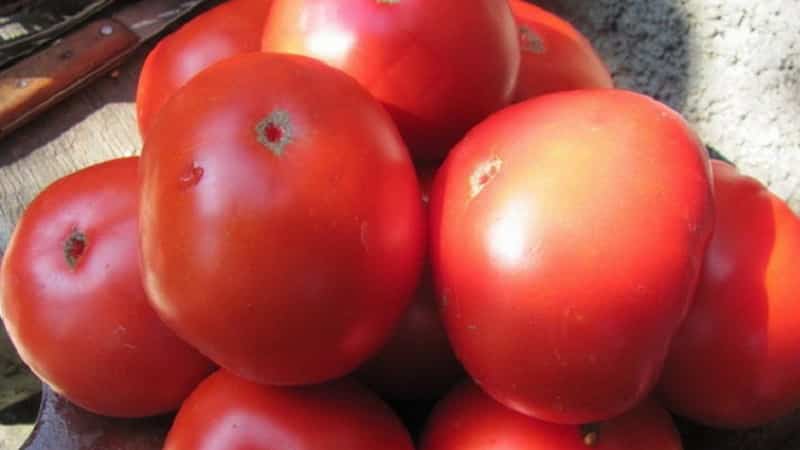
The bushes are massive, spreading, reaching a height of 70 cm. They need strong support and support. When plants are formed into 2-3 stems, it is possible to collect a good harvest of large fruits. Vegetable growers harvest up to 370 kg of crop from one hundred square meters. The first fruits are harvested after 110–120 days.
The leaves are medium, dark emerald. The peduncle is without articulations, the inflorescence is simple.
Advantages and disadvantages of the variety
Virtues of the Eternal Call:
- excellent taste of large fruits;
- high productivity;
- long shelf life (40–45 days in a cool, dark place);
- ease of care;
- good transportability (when collecting unripe fruits);
- possibility of cultivation in regions with a cool climate: the variety is frost-resistant, the fruits ripen in a short time.
The variety also has disadvantages:
- tomatoes are not used for preservation, since large fruits do not fit in a jar;
- the culture needs gartering and pinching.
Some vegetable growers notethat when picked for the first time, the tomatoes are more tasty, and later they are not so sweet and juicy.
Fruit characteristics and yield
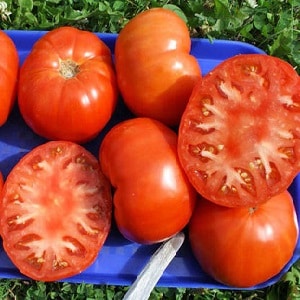 The raspberry-colored fruits have 4 seed chambers. Tomatoes are fleshy, sugary and have a delicate taste. They are eaten fresh and processed into juices and tomato paste. The fruits are not suitable for winter harvesting due to their large size. Vegetables tolerate transportation well without loss of taste and product characteristics.
The raspberry-colored fruits have 4 seed chambers. Tomatoes are fleshy, sugary and have a delicate taste. They are eaten fresh and processed into juices and tomato paste. The fruits are not suitable for winter harvesting due to their large size. Vegetables tolerate transportation well without loss of taste and product characteristics.
The shape of the tomatoes is flat with slight ribbing. The average weight is 500 g, but there are vegetables up to 900 g. From 3 to 5 kg of crop is harvested from one bush (for a low-growing variety this is a decent figure). In a greenhouse, the crop grows higher than in an open area, and more crops are harvested.
Which regions are best to grow in?
In the south of the country (in the Stavropol and Krasnodar territories, Volgograd region) the variety is grown in open areas, in shaded areas.
In central Russia (Yaroslavl, Bryansk regions, Moscow region and other regions), Eternal Call is cultivated in closed and open ground. In the north of the country (in Vologda, Altai and other regions), tomatoes are grown in greenhouses or greenhouses.
How to grow
Tomato variety Eternal Call does not require a special approach to cultivation. The crop is unpretentious in care, and you don’t have to put in a lot of effort to get a bountiful harvest.
Sowing of seedlings is carried out 60–70 days before before the intended landing at a permanent place. The soil mixture can be purchased at a gardening store or prepared independently from the following components:
- humus (4 parts);
- garden soil (4 parts);
- river sand (1.5 parts).
Seeds are deepened into the soil 1 cm. Moisten the soil carefully using a sprayer so as not to wash away the soil.
Seedlings require lighting (at least 8 hours a day). The optimal temperature regime for plants is from +23 to +25 °C. After picking, the variety grows well at lower temperatures - from +18 to +20 °C.
The main condition for growing a crop - regular but moderate watering. Water is used at room temperature.
Important! Excess moisture leads to acidification of the soil and rotting of seedlings.
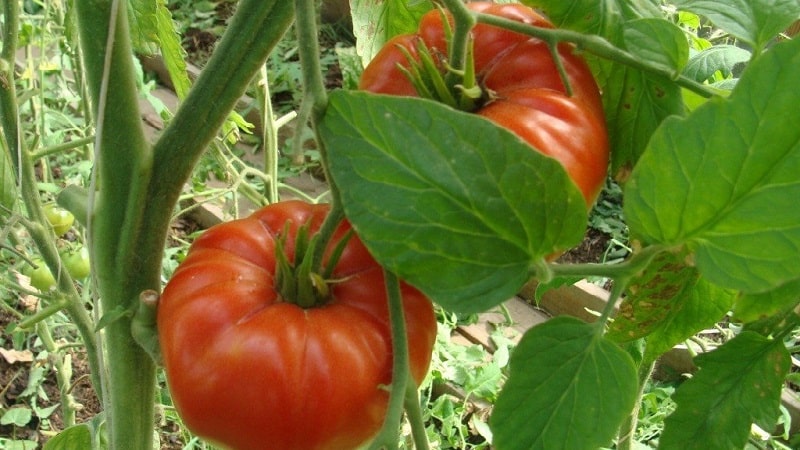
The first fertilizer is applied 14 days after picking. Subsequently, fertilizing is carried out another 2-3 times. Suitable for this:
- superphosphate;
- "Agricola";
- diammofoska;
- "Master".
Products are used strictly according to instructionsindicated on the packaging.
Transplanting seedlings
For higher yields and fruit quality at 1 m2 plant up to 3 bushes. This way the plants will go through a full growing season. One of the main conditions for high yields is sufficient space.
Once every 10 days, moisten the soil around the bushes. The condition of the soil is important: the soil around the plants must be loosened so that oxygen reaches the roots. Any soil can be selected, but the best option is black soil or soil mixed with humus.
Scheme for growing seedlings - 40x40. To increase the yield, pinching is carried out, leaving up to 3 side shoots.
Important! To prevent the development of late blight, the soil before planting is treated with a 1% solution of Bordeaux mixture.
Care
To prevent sunburn on the leaves, watering is carried out in the early morning, evening or in cloudy weather. They do this regularly, but in moderation. During the period of fruit set, the amount of moisture is increased. Watering is combined with fertilizers.
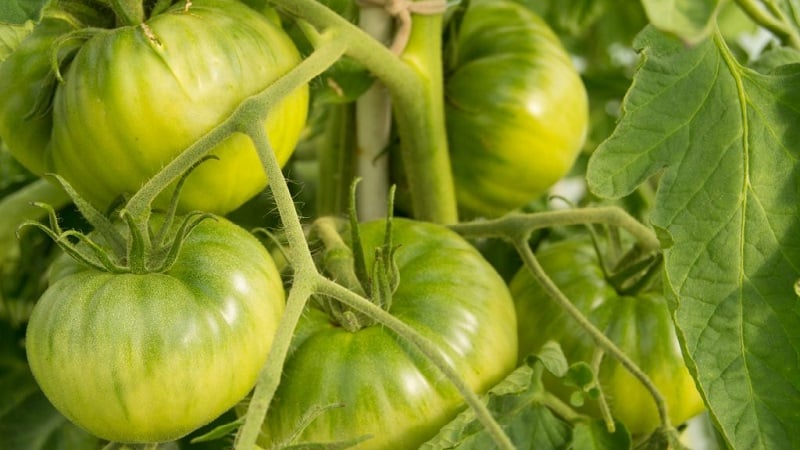
The first feeding with a mineral or organic composition is carried out after 2 weeks from the moment of picking tomatoes to a permanent place. Mullein mixed in water with superphosphate in a ratio of 8:1 is suitable. Further fertilizers are applied in dry form.
At 1 m2 will be needed:
- potassium salt - 1.5 parts;
- superphosphate - 2 parts;
- ammonium nitrate - 1 part.
All components are mixed until smooth and evenly applied to the soil.
The eternal call bears large fruits, so the bush is tied to a support, for which strong wooden stakes are driven into the ground.
The variety bears fruit on almost any soil. Crop rotation plays an important role - good predecessors for tomatoes:
- legumes;
- squash;
- green onions;
- pumpkin;
- zucchini;
- turnip;
- cucumber;
- beet.
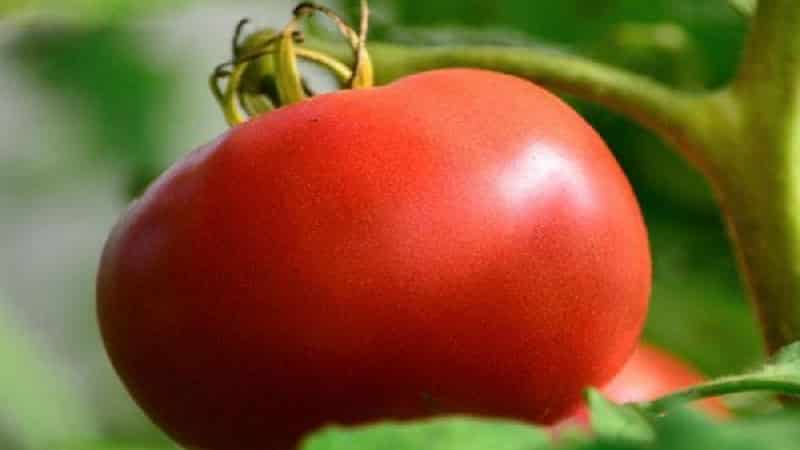
Tomatoes are not cultivated after potatoes, tomatoes and other nightshades earlier than 3-4 years.. Otherwise, the soil will become a potential carrier of various infections and pest larvae.
Important! Before planting the crop, the soil is fertilized with green manure. To do this, starting in the fall, the area is sown with leguminous herbs (sainfoin, alfalfa, clover), which are mowed and dug into the soil 5–8 cm 2 weeks before planting the tomatoes.
Prevention of diseases and pests
The Eternal Call variety has strong immunity to diseases and pests, but a small risk of infection still exists. Common reasons for this are improper care or bad weather conditions.
In order not to lose the harvest, bushes are regularly inspected for pests and signs of disease:
- Whitefly - This is a white midge on the bottom of the leaves. Prefers greenhouse conditions. Eliminate the problem by ventilating structures.
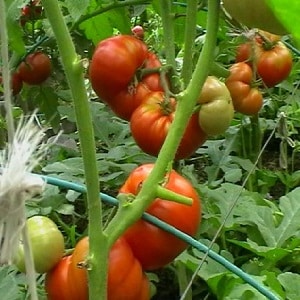 Spider mite - a small insect that spoils the leaves of the crop.Subsequently, the bushes become covered with yellow spots and die if control measures are not taken in a timely manner. The pest is destroyed with biological products: for example, “Actofit”.
Spider mite - a small insect that spoils the leaves of the crop.Subsequently, the bushes become covered with yellow spots and die if control measures are not taken in a timely manner. The pest is destroyed with biological products: for example, “Actofit”.- Aphid - an insect that eats plants in a greenhouse and in open ground. Aphids are dealt with using folk remedies: ashes, herbal decoctions (yarrow, chamomile).
- Apical rot. The disease appears as a black or brown crust on the top of the tomato. Observed on ripe fruits with a lack of calcium. The problem is eliminated by spraying the plants with a solution of calcium nitrate.
- Fusarium wilt tomato plant is a fungal disease that causes the bushes to look like they don't have enough moisture. The lower leaves begin to turn yellow, the stem cracks and becomes covered with a black crust. For prevention, crop rotation rules are followed. If the plant is already sick, use special drugs: for example, Previkur or Trichodermin.
- Gray rot - affects crops in a greenhouse. Leaves and stems are affected, but the fungus can also spread to fruits. Dark spots with a grayish tint can be removed by ventilating the greenhouse.
- Late blight causes yellowing and drying of the leaves, then spreads to the fruits. The reason for the appearance is excess moisture. To prevent the crop from dying, the watering regime and crop rotation rules are observed. If the plant is sick, it is pulled out and burned. For treatment, the drugs “Quadris”, “Tattu” or “Mikosan” are used.
- Curling leaves - a fungal disease that affects tomatoes at different stages of development. Prevention measures include timely feeding with microelements.
Reviews from gardeners
About the Eternal Call tomato vegetable growers respond mostly positively. This variety has more advantages than disadvantages:
Tatiana, Mtsensk: “In a gardening store, the seller advised me to buy the Eternal Call tomato. I immediately liked the photos and characteristics indicated on the package of seeds. The culture has shown good resistance to a number of diseases, especially late blight. When other tomatoes were already stunted and dry, the Eternal Call continued to pour. The fruits are very tasty and heavy. From 11 bushes I collected almost 40 kg of harvest. The whole family liked the tomatoes. Next time I will grow this wonderful variety again.".
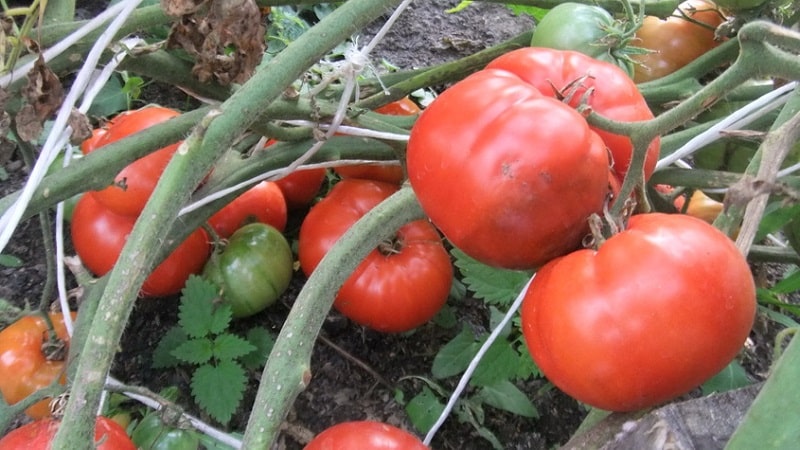
Dmitry, Abakan: “I don’t buy modern hybrid tomatoes; I prefer to plant my own seeds, so I grow proven varieties. One of them is the Eternal Call. Since I live in a cool climate zone, I try to support our Siberian selection. I believe that it is the most sustainable for our region. I grow tomatoes in a polycarbonate greenhouse. The variety is practically disease free. I advise everyone!".
Vladimir, Odintsovo: “I’m always trying to grow new varieties, but I have my favorite tomatoes, for example, Eternal Call. I have been cultivating these tomatoes for 4 years in a row and I am satisfied with them. The plant produces a plentiful, tasty harvest and practically does not get sick.”.
Conclusion
Thanks to the work of Siberian breeders, the Eternal Call tomato variety is able to grow in regions with cold climates. The crop produces a bountiful harvest of fleshy fruits (from 3 to 5 kg per bush) and is practically disease-free, which makes care much easier.
Excellent taste and shelf life (up to 40–45 days) allow you to enjoy fresh tomatoes for several months.